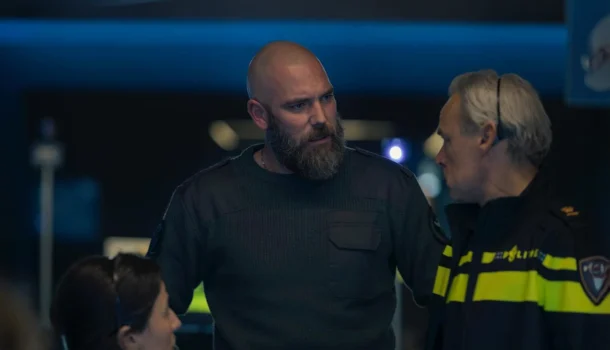The hostage crisis that unfolded on February 22, 2022, at the Apple Store on Leidseplein Square in Amsterdam could have easily become just another tragic footnote in police reports. Yet what transpired within that bright, mirrored space was far more intricate: a tense chronicle of urban fragility and the breaking points of contemporary social structures. With “iHostage”, Bobby Boermans transforms the real-life event into a cinematic narrative that transcends mere crime reportage, investing in an aesthetic and emotional immersion that places the viewer squarely between the horror of violence and the clarity of a cinema that intends to provoke.
Straying from the documentary reconstruction formulas that dominate the genre, Boermans crafts a sustained tension while preserving the subjective dimension of those involved. Though the film nods to productions like “United 93”, “Captain Phillips”, and “22 July” — all directed by Paul Greengrass — it avoids mere imitation. Instead, Boermans employs a distinct visual grammar, with tight framing and shadowed lighting that suggest more than they show, evoking a psychological confinement that surpasses the physical limits of the store. Mounir Hathout’s score operates as an invisible thread of unease, heightening the density of the environment and the oppressive drag of time suspended between irrational demands and charged silences.
Co-written by Boermans and Simon de Waal, the script avoids moral shortcuts. Rather than justify the perpetrator, it subtly — and wisely — implies that there is something deeply flawed in the economic and institutional architecture underpinning Western society. Shunning the cowardice of pseudo-neutrality, the filmmakers expose systemic failures without diffusing accountability. The Bulgarian character, the first lucid witness to the imminent threat, offers a lateral entry point into the narrative. Played by Soufiane Moussouli, he becomes not only a conduit to the chaos but someone who senses — perhaps earlier than others — that violence is not confined to extreme gestures but stems from an accumulation of social neglect.
The film’s most compelling turn occurs when the perspective of the undercover officer begins to guide the viewer’s interpretation of events. It is through his perceptions — balanced between stern professionalism and unexpected empathy — that glimpses of the perpetrator’s past begin to emerge. Without resorting to reductive explanations, the film suggests that the attacker’s brutality may have been rooted in experiences invisible to the public eye. Matteo van der Grijn’s performance is pivotal in this respect: his calculated antagonism is layered and free from melodramatic excess. Meanwhile, Jasmine Sendar’s portrayal of Valerie, a police officer unwavering in her convictions, brings to life a character of rare resolve, even when her decisions verge on idealistic naiveté.
“iHostage” is not content with merely recreating a night of panic — it seeks to expand the conversation about the blurry intersections between personal desperation and collective collapse. By resisting simplification and holding its audience in a near-claustrophobic state of suspense, Boermans’ feature achieves what few films based on true events can: surpassing the headline without losing its urgency, and confronting viewers not with closure, but with questions that continue to resonate.
Film: iHostage
Director: Bobby Boermans
Year: 2025
Genres: Crime/Drama
Rating: 8/10

